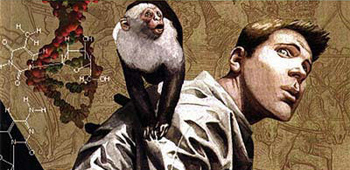Amazon’s highly anticipated Kindle Fire begins shipping this week, and that means discussion in the tech world can turn to only one thing: comic books. Fine, maybe not just one thing, but Amazon has already dramatically changed the landscape of the comic book industry without even shipping its outrageously low-priced tablet.
The Fire was announced alongside an exclusive deal with DC Comics, giving the new devices’ owners exclusive access to 100 of DC’s most famous graphic novel titles (for the uninitiated, graphic novel can be loosely translated as a big, and often really good, comic book), including classics like Frank Miller’s Batman: The Dark Knight Returns and Neil Gaiman’s The Sandman series, as well as popular newer titles like Green Lantern: Blackest Night and Y: The Last Man. DC had previously made fans happy by announcing that many of their popular series would be coming in digital forms released the same day as their paper equivalents. But the Amazon deal covers existing issues, and DC made no promises regarding their tremendous back catalog. Kindle Fire owners are the only comic book fans able to purchase some of the most iconic stories in comic book history in digital form.
Fans were less than pleased by the deal, because many have already purchased competing tablets for comic book viewing. DC seems to have left those readers some hope, promising that the titles would be available eventually through the Amazon Kindle app on devices other than the Fire. Unfortunately, DC could give no time frame for when the titles would move beyond Amazon’s device.
Barnes & Noble was outraged by the deal, which provides the Fire with an important edge over the brick-and-mortar bookseller’s own popular tablet, the Nook Color, and it’s new successor, the Nook Tablet. Following this announcement, B&N struck back by pulling the DC titles included in the exclusivity agreement from its physical store shelves. The retail bookstore giant is taking a stand, refusing to promote via its valuable shelf space any book available in a digital form only through their competition (though they’ve already stated an exception for the Harry Potter books, which are only available for digital consumption through author J.K. Rowling’s Pottermore website).
Of course, Barnes & Noble’s decision didn’t leave people much happier than the DC/Amazon deal did. The authors and artists of the affected comics are bystanders in this mess, seeing their great works getting restricted digital sales while simultaneously losing promotional space on store shelves. Neil Gaiman (author of 12 titles on the exclusive list) has been expressing his annoyance to his fans on Twitter and his blog. He’s not thrilled that his most famous series won’t be available in the format he and his family use themselves. And he’s mad enough at the B&N retaliation tactic that he no longer provides links to their website in his blog posts promoting his own work.
This whole comic book story has larger implications of course. Comic book fans are a relatively small market, and digital distribution is new enough that tiny would be a better description. But e-books have surpassed paperback sales and will likely outsell print in general in the coming years, and right now we’re looking at a fractured digital marketplace. While there is plenty of overlap, some titles are only available from Amazon’s Kindle store. Others are only accessible via Barnes & Noble’s Nook or Google Books. Until now, this has been a minor inconvenience. If you owned a dedicated reading device, you were locked into one store (the Nook Color has been hacked from ereader to full tablet status and has gotten the wider access to content that tablets enjoy). However, if you did your reading on a PC, tablet, or smartphone, you could install apps from all three major stores.
If we move into an era of devices locked to exclusive content, we face a market situation that, in the long run, benefits no one. The short-term benefits of exclusivity are obvious, but many customers (including author John Scalzi) are going to avoid the Kindle Fire and Nook Tablet in favor of something that lets them access all of their content. Authors lose sales they could’ve had if users had access to all of these platforms. Let’s not forget the consumers, who just want to read books and not have to think about all this inside baseball nonsense.
Fortunately, there seems to be a glimmer of sanity entering the situation. Amazon shocked many in the tech world by announcing that the Kindle Fire would include options for viewing Netflix and Hulu Plus, direct competition for Amazon’s Video on Demand service that would presumably be one of the ways Amazon hopes to make a profit from selling all those Kindle Fires at a loss. It was a level of openness that few expected. Let’s hope it’s a sign of things to come, because one thing is certain. I may buy myself a tablet at some point, but there’s no way I’m buying them two at a time.



Comments are closed.